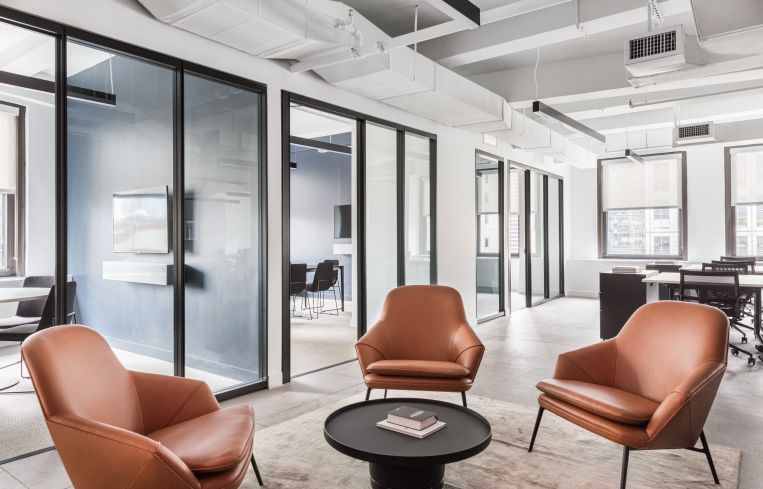Breather’s Deskpass Merger Bets on Flex Workspace Boom
Breather ran out of air early in the pandemic before Industrious resuscitated it. Now, it and Deskpass will be in 200 markets.
By Philip Russo February 20, 2024 6:27 am
reprints
A full return to office may be withering on the vine, but last week’s announcement that proptech startups Breather and Deskpass plan to merge demonstrated the companies’ belief that the bloom has not come off the flex space market.
In announcing the merger, the CEOs of Breather, a subsidiary of Industrious, a flexible workplace company, and Deskpass, one of the largest networks of on-demand flexible workspaces, expressed confidence that the relatively small but growing demand for such office space will increase exponentially in the near future.
Both sides declined to comment on the deal’s financials beyond that Industrious will own 40 percent of the combined entity. Together Deskpass and Breather have an inventory of about 2,000 spaces across 200 markets in the U.S., and about half a million users.
“I think people probably underestimate the degree to which the carnage in long-term leasing has either not impacted by the day or by the hour flex space, but probably more accurately has actually benefited this little corner of commercial real estate a lot,” said Jamie Hodari, co-founder and CEO of Industrious. “There are so many companies that have gotten out of their headquarters, but once a month they want to rent a great space for the whole team to gather or for people who have moved to a new city, and they want to find a local coworking space to work out of. There’s just an enormous amount of that.
“And so I think we’ve done a good job managing Breather, and Sam [Rosen, CEO of Deskpass] has done an incredible job managing Deskpass. But I won’t lie, there’s clear tailwinds here. You just need to do a competent job in these kinds of businesses where you see almost 30 to 50 percent a year of sector-level increase in demand.”
Industrious says its revenue has increased 300 percent since COVID, so the merger with Deskpass is not predicated on flex space replacing traditional long-term leasing. Instead, the theory is that it will move from 2 percent of commercial real estate to 10 or 15 percent, said Hodari.
The demand for hybrid work arrangements or alternatives to five-days-a-week, in-office policies has continued to normalize in the years following the pandemic, according to the two companies. They cited an annual report from research firm Owl Labs that found 66 percent of companies are mandating in-office work, while only 22 percent of employees are happy with the in-office work style. This divide results in 41 percent of employees saying they would comply with an in-office mandate without complaint, 22 percent would return unhappily, and 31 percent would return but start looking for a new job. Six percent would quit entirely.
“We’ve just believed so strongly with every passing year that there’s going to be more people, more distributed teams, and people who want space for a day, who want neighborhood solutions,” Hodari said. “But that doesn’t need to supplant the whole traditional commercial real estate ecosystem in order to be an extraordinary success. It just needs to be a slightly larger minority of that ecosystem than it currently is.”
Industrious acquired Breather after it went bankrupt in December 2020 in the midst of the pandemic. However, Breather’s basic business model had much to offer, said Rosen.
“It was doing a lot of revenue in a few markets,” Rosen said of Breather. “And it’s one of a handful of businesses that have come into this flexible on-demand space that has shown true product-market fit.
“What Breather built and what they scaled to is real and not an accident. Their pivot into an asset-light marketplace was a logical pivot where they could provide a similar level of experience and value, but in an economic model that makes a lot of a lot more sense.”
The merged startups are deciding whether to consolidate behind the Deskpass name or the Breather name, but will continue to run both sites for now, said a spokesman in a written statement. Hodari and Evan Fain, general manager of new ventures at Industrious, will join the Deskpass board of directors.
The combined companies offer a range of flex space options for occupiers, said Rosen.
“Breather today only sells meeting rooms, while Deskpass sells hot desks, desks by the day,” he said. “We also sell meeting rooms and private offices by the day, week, or month to month.”
In comparison, Industrious provides short-term leases for top-shelf offices with amenities, Rosen continued. “Deskpass and Breather are in the 90-day-or-less market: ‘I need a meeting room for half an hour, an office for the next few months, or for an undetermined amount of time.’ That really is the part of the market we’re focused on, the half an hour to 90 days.”
Philip Russo can be reached at prusso@commercialobserver.com.



